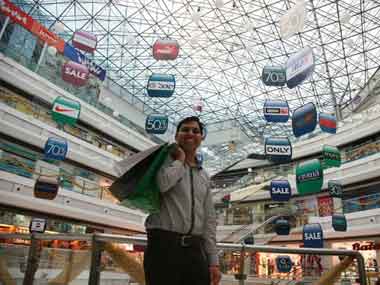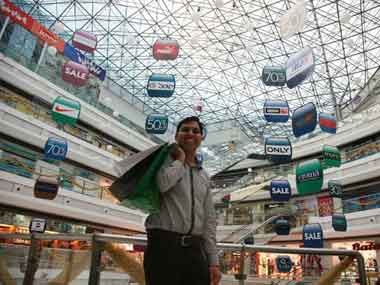By Pranbihanga Borpuzari
As retail chains grow, quantity often overshadows quality and there is every chance that customer service may take a beating. In such a scenario, how does a company ensure that every outlet maintains the expected level of customer service? Mystery shopping and the audit that follows is the answer. Pankaj Guglani, 34, came up with the idea of mystery shopping during the last few months of his MBA at Management Development Institute, Gurgaon in 2007.
The concept? A mystery shopping service that offers a simple and effective way to evaluate the way customers are treated.
A group of people are chosen to visit or call businesses posing as ordinary customers and provide detailed evaluations of their experience using written reports or questionnaires. These reports are then analyzed and shared with clients who take corrective action. “The concept appealed to me because of the huge impact it could have on the retail industry, [which had just started booming,] and other consumer sectors. Also, it could leverage technology to achieve scale with the potential of going global,” says Guglani. He gave his idea a form in December 2009 when he launched RedQuanta in Mumbai.[caption id=“attachment_690394” align=“alignleft” width=“380”] RedQuanta CEO Pankaj Guglani.[/caption]
RedQuanta CEO Pankaj Guglani.[/caption]
Mix and match
“We do detailed audits to assess multiple parameters of business operations such as ambience, hygiene, service standards, product quality and billing. Our micro audits assess only one or two parameters-typically those needing immediate attention like promotions, quality, loyalty programs,” says Guglani, CEO, RedQuanta.
RedQuanta matches profiles of mystery shoppers to a client’s target customer base in terms of income, age and lifestyle. Shoppers include people across income brackets (Rs 4 lakh to Rs 4 crore per annum) and age groups (18-65 years). “We also capture lifestyle and shopping preferences,” says Guglani. To become a member, one needs to sign-up on the website or Facebook, where the company regularly posts shopping assignments. The mobile application further simplifies the process as it allows members to log in and check for the nearest audit. In this case, the questionnaire and an audit brief are sent to the mystery shopper in real time. Once filled in, updates and data are sent to the respective client in real time too.
“Mystery shoppers can discover assignments near them using our location-aware application and submit feedback,” explains Guglani. RedQuanta also has a shopper recommendation engine to ‘best match’ shoppers and assignments.
Impact Shorts
More ShortsMystery members
Guglani says their relation with members is continuous. “Depending on a person’s profile and location, we keep offering assignments. Though, there are limits on how often a mystery shopper can visit the same client location in a specified time interval,” points out Guglani. RedQuanta identifies shoppers via references, social media and alumni groups. It has 20,000 shoppers registered to date.
Before assigning an audit, the amount likely to be reimbursed is communicated to a mystery shopper, which generally depends on different variables like the scope of audit, place, client involved and the shopper’s profile.
Divya Sengupta Mukherjee says that mystery shopping for RedQuanta has been a pleasant experience since she signed up two years ago and has executed a host of audits for salons, financial services and coffee shops.
“When I started, questionnaires were long and sometimes took three hours to complete. The system has evolved over the years and is relatively easier to provide feedback. The team takes great pains to understand and listen to the mystery shopper,” says Mukherjee. She mentions that expenses incurred during the audit are reimbursed within 30 days of completion.
Consumer insights
Mystery shopping quantifies the customer experience into identifiable numbers and builds accountability in the system. RedQuanta’s clients, therefore, gain insights into key metrics like conversion ratio of walk-ins, average ticket size of purchases and number of repeat customers. The company today serves clients across over 15 industries with big ticket names like Mahindra & Mahindra, Samsung, NIIT, Yatra.com, Inkfruit, Indiatimes Shopping, Bajaj Capital, Reliance Retail, Fun Cinemas, and Enrich Salons and Academy, among others. It is present across 550 cities servicing 70 clients.
“We wanted to do mystery shopping because we are in the business of customer service. We tested out other services but liked RedQuanta because of the analytics it provides on feedback given by a mystery shopper and the technology used,” says Bhupesh Dinger, Director-Operations, Enrich Salons and Academy. Positioned as a mass premium salon, it runs 50 outlets across Mumbai, Ahmedabad, Pune and Bengaluru. An audit by RedQuanta, in Enrich’s case, would measure all touch points that a customer is likely to have-from appointment bookings, salon service, billing and the overall experience.
Shopping funds
RedQuanta was bootstrapped with capital of `10 lakh from personal savings and some from friends and family till April 2011, when Guglani raised angel money. Exactly a year later, he raised institutional funds. India Quotient, Blume Ventures, India Venture Partners, The Morpheus and a group of angel investors in Mumbai have invested in RedQuanta. Without getting into the specifics of funds raised, Guglani said total capital raised is just
under Rs 2.5 crore.
“RedQuanta is making available the latest technology platform for mystery shopping. It will integrate closely with social media to understand the kind of shoppers we are offering people, capture real time survey questions, photos and videos,” says Anand Lunia, Founder, India Quotient and an angel investor. Referring to the recent spurt of retail services in India, Lunia points out, “India has fewer branded pizza outlets than London. There is a long way to go.”
The startup has been growing steadily from a six-people setup in 2010 to 30 today and is still expanding. Lunia and Dinger suggest that RedQuanta should try and keep pace with the expansion (of outlets, services) of its clients. According to Lunia, the company is currently able to reach only large clients and multi-national corporations. “An owner running five restaurants would like to use their service too. They have to tie up with local marketing agencies to be available to these clients,” says Lunia.
Guglani has a mind map for his efforts. “The dream is to create a mystery shopping brand like what Xerox is to photocopying. All our efforts are towards this goal,” concludes Guglani.
(The article was first published in Entrepreneur magazine.)
)